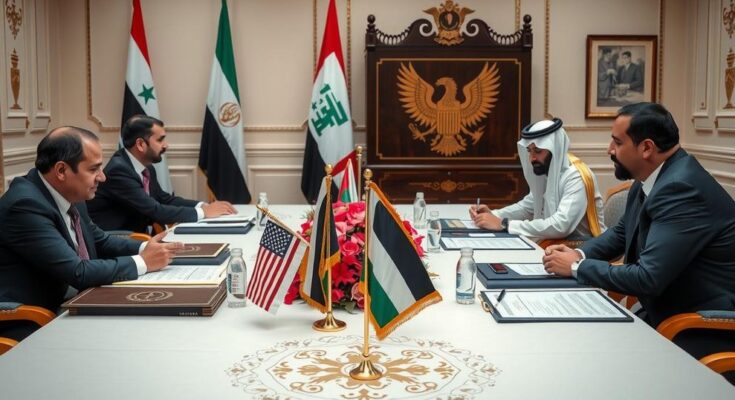U.S. Secretary of State Antony Blinken engaged in discussions with foreign ministers from Jordan, UAE, Qatar, and Egypt regarding Syria. He emphasized the importance of a Syrian-led political transition and the responsibility of local authorities to secure and dismantle chemical weapons. The U.S. will support a future government that fosters inclusiveness and transparency while concerning regional stability.
On Tuesday, U.S. Secretary of State Antony Blinken conferred with foreign ministers from Jordan, the United Arab Emirates (UAE), Qatar, and Egypt regarding the ongoing situation in Syria. Accompanying these discussions, Secretary Blinken reiterated the necessity for a Syrian-led and owned political transition, which should foster credible, inclusive, and non-sectarian governance. He emphasized that those who govern Syria must take responsibility for securing and safely destroying any chemical weapons within their jurisdictions.
During the news conference, State Department spokesperson Matthew Miller outlined key principles endorsed by Secretary Blinken, including the protection of minority rights, the facilitation of humanitarian aid, and the prevention of Syria being utilized as a terrorist base. Furthermore, Miller noted that the U.S. will support a future Syrian government that emerges from an inclusive and transparent political process, free from foreign interference.
Miller also highlighted that the U.S. will assess the intentions of local groups, such as Hayat Tahrir al-Sham (HTS), not merely by their rhetoric but by their forthcoming actions. The Secretary’s discussions involved a commitment to maintain engagement with regional partners and uphold support for the Syrian populace amid this crucial transition.
These discussions follow significant developments in Syria, notably the departure of Bashar al-Assad, who has led the country for nearly 25 years. His regime faced mounting opposition, culminating in his fleeing to Russia after anti-regime forces captured the capital, Damascus. The evolving political landscape in Syria necessitates careful management of regional relations and humanitarian concerns.
The discussions regarding Syria occur against a backdrop of prolonged conflict, which has seen the country submerged in a civil war since 2011. Various geopolitical elements, including the involvement of external powers and internal factions, complicate the path toward stability. The U.S. has expressed a commitment to supporting a governance transition that prioritizes inclusiveness and minority protections while also addressing the potential threats posed by remaining chemical weapon stockpiles. Secretary Blinken’s outreach reflects ongoing efforts to re-establish diplomatic communications across the region, emphasizing a collaborative approach to resolving the Syrian crisis.
In conclusion, Secretary Antony Blinken’s recent discussions with Middle Eastern counterparts about the situation in Syria serve as a reaffirmation of the U.S. commitment to an inclusive political transition within the country. By stressing the importance of controlling chemical weapons and supporting the rights of all Syrians, the Secretary aims to lay the groundwork for a stable governance structure that can endure the challenges facing the region today. The continued engagement with regional leaders indicates the United States’ dedicated support for a constructive resolution to the Syrian dilemma.
Original Source: www.aa.com.tr




